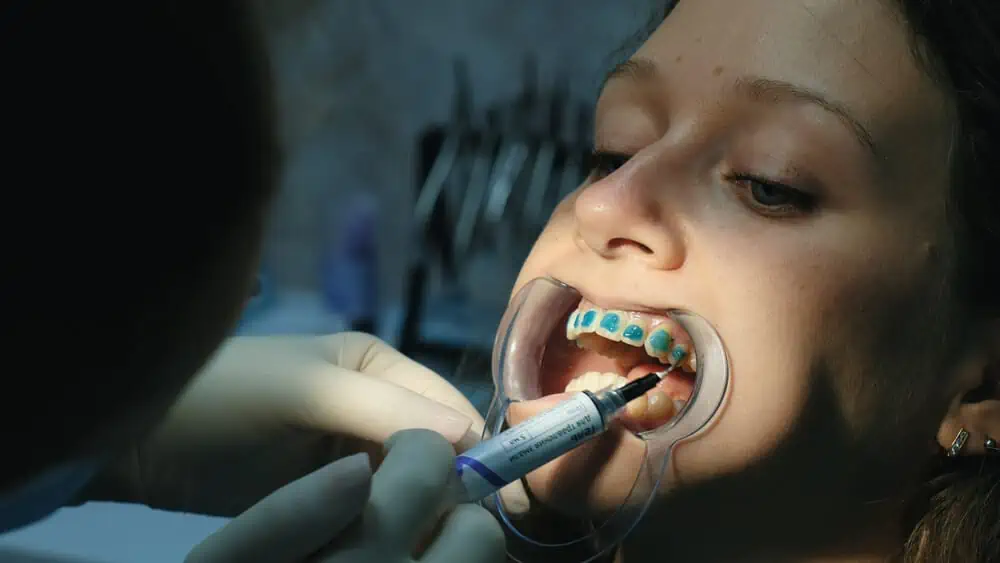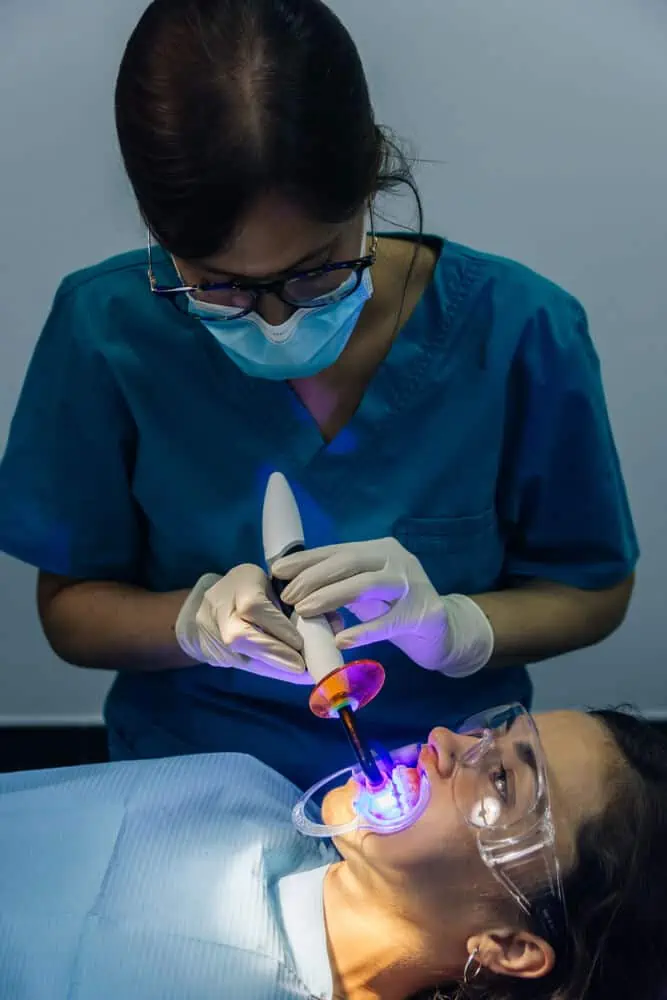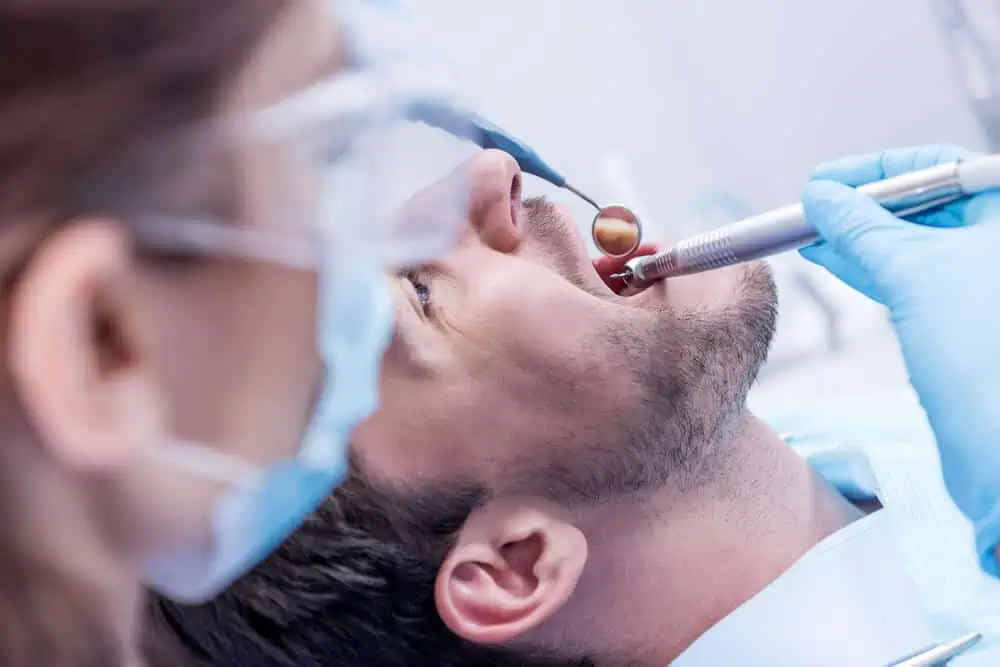what kink of glue is used to repair gold tooth back ion gums
Information technology is like shooting fish in a barrel to assume that you are never going to run across a real dental emergency that requires dental glue.
Later on all, you are doing everything that you tin can to take good care of your teeth—cleaning them twice a day, being careful of what you seize with teeth into, flossing regularly and visiting a dentist every now and and so.

However, if you accept ever experienced a broken molar and required dental restoration, information technology may take been tempting to simply gum the tooth back together with your everyday craft glue. This is definitely non something you lot should do!
There is actually a special kind of mucilage for teeth, which goes by the name of dental mucilage (or dental cement), and is used by dentists to assistance restore broken teeth and prevent farther damage.
So what is dental glue? What is it made of and how does it help with a dental repair? Keep reading to discover out!
If you are wondering how to temporarily repair your molar at abode, our guide to home tooth repair kits can assistance.
Table of contents
- 1 What is dental glue?
- 2 How does dental glue work?
- 3 Types of dental glue: permanent vs temporary
- 3.ane Temporary dental glue
- 3.ii Permanent dental gum
- 4 Types of dental gum: composition
- 4.1 Drinking glass ionomer cement
- iv.two Bioceramic cement
- 4.3 Zinc oxide eugenol cement
- 4.four Zinc phosphate cement
- 4.5 Adhesive resin cement
- four.half-dozen Aesthetic resin cement
- 5 How do dentists choose dental glue?
- 5.1 Longevity
- five.2 Durability
- v.3 Aesthetics
- 6 Application techniques
- 7 Tin you use superglue on teeth?
- 8 Conclusion
- 9 FAQs
- ix.i What gum can y'all use on teeth?
- 9.two How can you intendance for a dental crown with temporary dental glue?
- nine.3 My crown fixed with temporary gum just fell off. Practise I have to get back to the dentist or tin I glue it dorsum on myself?
What is dental gum?
Dental glue, likewise known as dental cement, tooth glue, or tooth crown glue, is used by dentists for securing a dental implant or restoration (a fixed bridge, inlay, onlay, or crown) to your damaged teeth.
It can be purchased over the counter, but in this instance, it is only meant for very temporary handling.
Dental cements possess unique chemical features that assist in achieving their purpose: to ensure that the carefully crafted dental restorations stay exactly where they should be—in your mouth.
Dental glue is usually advertised equally a curt-term set up for chipped teeth, damaged veneers, and broken crowns. Nevertheless, some newer products have been launched which tin be used every bit a long-term solution besides.
Let's take a brief look at how dental glue actually works.
How does dental glue work?
Dental glue uses compression to piece of work. In some types of dental cements, a chemical bond occurs. The forcefulness exerted by the compressed dental glue under the tooth crown holds and bonds it together. The chemic bail formed between the mucilage and the crown provides extra strength and it is less likely to intermission downward compared to glue that does not form bonds.
However, because chemically-bonded dental cement possesses college strength, information technology may cause difficulties during the removal of crowns for repair or replacement purposes.
Stronger dental cement is a great selection for those who continually grind their teeth as it can provide additional stability to the crowns and go along them intact for a longer duration of time.
Would y'all like to speak to a dentist about dental cement, or get an assessment of your dental problem?
Find a dentist nearly you now by calling 800-794-7437. You will be continued to a live operator who will put you through to a qualified dentist in your area.
Alternatively, if you're non sure you lot want to brand an in-office engagement merely yet, you may want to see a dentist online beginning. If you lot're curious to find out more nearly how teledentistry works, you can read our separate article nearly online dentists.
Types of dental mucilage: permanent vs temporary
Dental cement is classed according to its application:
| Fine grains used for luting and cementation | |
| Medium grain used for orthodontic purposes | |
| Used for restorative purposes | |
| Used for liners or base of operations applications |
Dental glue for crowns and other restorations are classified differently based on their duration of apply and composition.
When information technology comes to durability, dental cements are simply classed as 'temporary' or 'permanent'.
Temporary dental glue
Temporary cement is a part of the temporary filling kit which is normally used to gear up crowns and other restorations for a short duration of time.
A dentist uses this kind of dental crown glue in circumstances where they wish to observe and appraise the response of your teeth to the restoration in use.
Temporary cements are usually made up of eugenol, olive oil, and zinc oxide pulverization.
Temporary dental glue features the post-obit aspects:
- Provides a adept grip on teeth besides as on the dental crowns
- Easily tolerated past the surrounding tissue
- Like shooting fish in a barrel to remove
- Protects a damaged tooth and helps minimize its sensitivity
- Saliva helps information technology dissolve in a short flow of fourth dimension. Considering of this, temporary gum must be replaced with permanent mucilage in 3 to 6 weeks following its application
- Possesses a low resistance
Permanent dental glue

Permanent dental glue is the type of teeth mucilage used for fixing various dental restorations on a permanent basis. In contrast to temporary dental glue, permanent gum is fabricated up of hard and breakable materials obtained by mixing liquid and powder together.
These are the features of a permanent dental glue:
- Creates a strong bond with the tooth and the restoration to provide long-term, permanent protection
- Easily tolerated past the surrounding tissue, thereby preventing expressionless teeth and tissue.
- Provides practiced sealing at the margins to prevent leakage
- Protects the dental tissue from all sorts of external stimuli
- Provides infrequent resistance
- Does not dissolve in saliva or any other oral liquid, thereby offering permanent protection
Types of dental glue: limerick
Depending on what it's fabricated of, dental cement tin can exist divided into six types:
Glass ionomer cement
Drinking glass ionomer cement is made from powdered drinking glass mixed with an acid. It is used for the terminal cementation of bridges and crowns made from alloys, but it doesn't attach to porcelain. Glass ionomer cement is oft the material of selection for filling children'south milk teeth, too.
Bioceramic cement
Bioceramic dental cement is a permanent agglutinative amanuensis that appears opaque on x-rays. Information technology's unremarkably used for endodontic (root canal) work because it is biocompatible, meaning it can either function as natural tissue or encourage the regeneration of tissue.
Zinc oxide eugenol cement
Zinc oxide cement is an oil-based mucilage used to soothe the pulp of a broken tooth. It is usually avoided in cases where permanency is required. This cement is particularly helpful to temporarily cement a tooth with exposed dentine. Nowadays, many companies add different splinting agents to the zinc oxide cement to grant it permanent luting effects.
Zinc oxide eugenol is not considered to be a strong product for cementing most types of dental restorations, and its use is normally limited to gluing stainless steel crowns, acrylic crowns, and cast restorations.
Zinc phosphate cement
Zinc phosphate cement was one of the kickoff permanent cements to be used in dentistry, and it remains in wide use today for a variety of permanent restoration purposes.
Although it doesn't chemically bail to the tooth surface, it has exhibited significant long-term success. However, it is gradually becoming less pop because its relatively high acerbity can irritate tooth pulp.
Adhesive resin cement
Adhesive resin cement is a permanent dental glue that bonds with well-nigh ceramic and alloy restorations, except implant-supported crowns, veneers, indirect resin restorations, and bridges.
Aesthetic resin cement
Aesthetic resin cement contains translucent resins that are bachelor in different shades, meaning it can be made to match the natural tooth color. It is normally used for bonding all-ceramic and indirect blended restorations, including repairing a chipped tooth.
This blazon of glue has loftier resistance and utility and a unique limerick that does not suspension apart or dissolve.
How do dentists choose dental glue?
Usually, dentists decide on the kind of dental cement they use depending on the following 3 factors:
Longevity
Longevity is 1 of the chief factors that the dentist volition consider when choosing the best glue for y'all. For instance, they may use a temporary or a permanent glue depending on how long you need the crown.
Durability
Durability really matters when it comes to choosing the right kind of dental glue, and it basically depends on the type of restoration used.
Permanent dental glue provides expert durability and is used for keeping long-term crowns and bridges in place. In contrast, people who do not crave a hard cease can try the eugenol-free glue.
Aesthetics
Depending upon your aesthetic requirements, dentists may choose different sorts of dental gum. For example, near people get a temporary glue fabricated with resin because its base is articulate in colour and it is aesthetically pleasing.
At the same time, this blazon of glue is difficult to remove and may get discolored easily. So, all these factors must exist kept in listen when deciding the right type of dental glue.
Awarding techniques
There are a number of steps that dentists usually follow in lodge to apply the mucilage. In this scenario, we will discuss its awarding in reference to broken crowns.

- The oral fissure is properly cleaned followed by cleaning and disinfection of the crowns. The dentist usually puts a rubber dam or cotton wool rolls in the rima oris to get rid of whatever fluid.
- The gum is prepared co-ordinate to the instructions until the desired consistency is achieved.
- The dental glue is then applied to the interior of the crown in such a manner that it covers information technology completely.
- The dentist and then places the crown on the abutment of the molar in order to foreclose any misplacement.
- Subsequently the restoration process is completed, all extra glue is cleared away.
Later the process, the patient is brash to maintain adept oral health and go on in touch with the dentist.
Can you apply superglue on teeth?
'Superglue' is the commercial proper name for cyanoacrylate adhesives meant for some household and medical purposes. This type of agglutinative is not meant for internal use. Don't utilize superglue equally a dental glue. Some people may even take an asthmatic or a skin reaction every bit presently equally they come in contact with superglue.
Superglue may also have a serious reaction with different types of natural fibers, for example, cotton which is commonly used in dental procedures. These reactions exacerbate the release of toxic fumes and may even atomic number 82 to combustion,
Furthermore, super glue tin can form instant bonds with your pare. Yous could easily cease upward with your restoration glued to your own finger or your finger to your tooth, lips, natural language, or cheeks while trying to fix your broken tooth!
Instead of using a household glue to effort and prepare your teeth, at that place are specially designed kits you lot can use for temporary filling repair if your filling vicious out, or tooth replacement.
Conclusion
Dental mucilage is an amazing cosmos designed to concur your damaged tooth together and protect it from farther harm. Information technology can provide both short-term and long-term benefits, but must only be used nether the supervision of your dentist.
Afterwards whatever procedure involving dental glue to repair your teeth, have extra intendance regarding your oral wellness and visit your dentist once or twice a year at least, depending on the recommendation of your dentist, to make certain that everything continues to be in order.
If y'all still have questions nearly dental mucilage, why not consult with a dentist. Discover yours now by calling 800-794-7437.
FAQs
What glue can you utilise on teeth?
But special dental adhesives should be applied to your teeth. For instance, if you lot attempt to use superglue, it could end up permanently damaging your tooth, eventually requiring a total molar extraction.
How tin can you intendance for a dental crown with temporary dental glue?
When you get a temporary dental crown that is going to stay in your oral cavity for a couple of weeks, it is crucial to have care of it. Along with maintaining skilful oral hygiene, try these tips.
- Avoid chewing on the side with the afflicted tooth
- Avert consuming hard-to-chew or sticky foods
- Inform your dentist if whatever discomfort arises
My crown fixed with temporary glue merely fell off. Do I have to go back to the dentist or can I gum it dorsum on myself?
If your temporary crown falls off yous should make an date to see your dentist equally soon as possible. In the meantime, you can purchase OTC dental glue to ready it. This is not a permanent solution, and will only last a couple of days.
Sign upwardly to receive the latest news and offers from Dentaly.org
Thank you,
for signing up for Dentaly.org newsletter! You will receive a confirmation email.
Oops error,
Something has happened when you lot tried to ship usa your data. Delight try later. Check the information you entered.
Source: https://www.dentaly.org/us/restorative-dentistry/dental-glue/
0 Response to "what kink of glue is used to repair gold tooth back ion gums"
Post a Comment